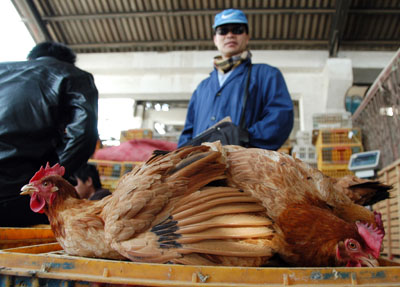A woman who died last week from bird flu in Shanghai became sick after buying
chickens from a street market where stall owners flouted a ban on live poultry
sales, a magazine reported Monday.
|

Chinese chicken
vendors wait for customers in Sanguantang Poultry Wholesale Market,
the largest of its kind in east China's Shanghai Municipality, March
25, 2006. The market has stopped culling live poultry as China's Health
Ministry confirmed on Friday that a 29-year-old woman in Shanghai had died
of bird flu. [Newsphoto
|
Shanghai
officials have so far refused to say how the 29-year-old migrant worker became
ill, although they say they have traced those who had contact with her and
boosted flu detection measures.
However, the respected financial magazine Caijing said its own investigation
showed Li became sick after buying two chickens from a stall outside the
downtown Tangjiawan market on March 8.
The market stopped selling live chickens last September after the city
imposed a ban. But unlicensed stalls set up on the street outside were still
selling live poultry, the magazine said in a report posted on its Web site.
Most of those stalls have since been closed and the entire market
disinfected, it said.
The Health Ministry confirmed Friday that the woman, who died March 21, had
the H5N1 strain of bird flu, making her the first human case in Shanghai _
China's largest city. She was the mainland's 11th human death from the disease.
Caijing said the vendor who sold the chickens to Li has not been seen for
several days. Li's husband and co-workers at a downtown construction site were
being monitored for flu symptoms but were so far not showing signs of illness.
A woman who answered the phone at the Tangjiayuan market's administration
office said all poultry sales had been suspended and the market disinfected.
"As far as I know, that woman who died from bird flu bought dead chickens
from some vendor who sold chickens outside the market without a proper license,"
said the woman, who refused to give her name.
The government has offered few details about Li's case. World Health
Organization officials say they have asked for more information.
Staff at the city government spokesman's office said they had not seen the
Caijing report and had no new information.
"We haven't heard from relevant departments about how this woman got infected
by the virus, said a woman who answered the phone at the spokesman's office. She
refused to give her name. Calls to the city health bureau rang unanswered.
Despite calls from the country's leaders for more openness, Chinese officials
are frequently accused of restricting public information about disease
outbreaks, often to avoid criticism from their superiors.